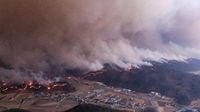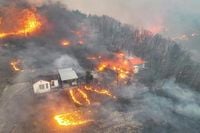In a tragic turn of events, the number of fatalities from the devastating forest fires in southeastern South Korea has reached 31, marking one of the worst natural disasters in the nation's history. Reports from Yonhap news agency on April 2, 2025, detail the extensive damage caused by these fires, which have affected thousands of homes and agricultural facilities.
The fires have ravaged over 4,000 houses, nearly 2,000 agricultural and livestock facilities, seven temples, and 986 other structures. The destruction is staggering, with around 48,000 hectares of forest burned across 11 regions, leaving more than 3,000 individuals homeless.
The Ministry of Internal Affairs of the Republic of Korea confirmed that one person who sustained serious injuries in the province of Kensan-Pukto has succumbed to their wounds, bringing the total death toll to 31. Additionally, eight individuals have suffered serious injuries, while 36 others have sustained minor injuries as a result of the fires.
On March 30, 2025, Reuters reported that the catastrophic fires may have originated from careless handling of a cigarette during a family ritual at a gravesite. This alarming possibility highlights the need for heightened awareness regarding fire safety, especially in areas prone to such disasters.
The scale of the evacuations has been significant, with approximately 24,000 residents initially forced to leave their homes to ensure their safety. The fires have not only caused loss of life but have also inflicted severe damage to the environment and local economies.
As the situation continues to unfold, authorities are working tirelessly to contain the fires and provide assistance to those affected. Emergency services have been deployed to the hardest-hit areas, and relief efforts are underway to support the displaced population.
The impact of these fires extends beyond immediate physical damage. Communities are grappling with the emotional toll of losing loved ones, homes, and livelihoods. The local government is coordinating with various organizations to deliver aid, including food, shelter, and medical assistance to those in need.
While the fires are being managed, the long-term consequences on the region's ecology and economy remain a concern. Rebuilding efforts will require significant resources and time, as many families face the daunting task of starting over.
In light of this disaster, experts are urging the government to review and enhance fire prevention strategies to mitigate the risks of future incidents. The need for better education on fire safety practices, especially in rural areas, is paramount to prevent such tragedies from occurring again.
The forest fires in South Korea serve as a stark reminder of the power of nature and the importance of preparedness in the face of such calamities. As the nation mourns the loss of life and begins to heal, the resilience of the affected communities will be put to the test.
In conclusion, the ongoing crisis demands urgent attention and action from both local and national authorities to ensure the safety and recovery of those impacted by these devastating fires. The collective efforts of the community, government, and support organizations will be crucial in the coming weeks and months as they navigate the challenges ahead.





